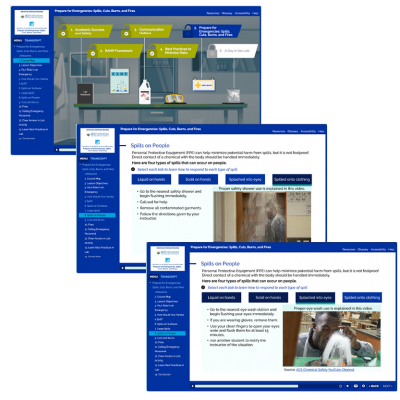ACS Essentials of Lab Safety for General Chemistry
A course that prepares students to enter the general chemistry lab.

Why ACS Essentials of Lab Safety for General Chemistry
ACS Essentials of Lab Safety for General Chemistry is a 90-minute online course that provides students with the vital concepts of chemical safety and prepares them for their first experiment in the general chemistry lab.
The course consists of 5 instructional modules that introduce the RAMP framework and walk students through the four principles of RAMP and the last summary module that assess key points presented in the previous modules.

Learning Objectives
- Identify learners’ role in maintaining a positive safety culture
- Understand GHS pictograms, labeling, and safety data sheets
- Recognize common laboratory hazards
- Assess and minimize the risks of those hazards using best practices
- Prepare for and respond to unplanned events and emergencies

Content Highlights
- Introduces the RAMP framework and walks students through the four steps of RAMP: Recognize hazards, Assess risks, Minimize risks, and Prepare for emergencies.
- An end-of-course capstone exercise to assess understanding of foundational lab safety protocols
- Save faculty members’ time for teaching and novel research
- Prioritize lab safety as a core competency across a wide range of learners
- Equip every member in the lab with critical risk-based safety concepts and skills
- Increase the overall awareness of the potential hazards present in the lab
- Painless updates between versions to ensure content relevance
Customer Reviews
Trusted Subject Matter Experts
Safety is a core value of the ACS across all divisions, including Membership, Education, and Publications. In creating ACS Essentials of Lab Safety for General Chemistry, we worked directly with top safety professionals to develop a course to more effectively teach students to be safe in the lab.
University of California, Los Angeles
Professor of Chemistry and Executive Director of the University of California Center for Laboratory Safety, Craig Merlic is a nationally renowned expert in chemical and laboratory safety.
Gannon University
Throughout her membership on the ACS Committee on Chemical Safety, Dr. Tallmadge has supported several safety related projects, including a recent revision of Safety in Academic Chemistry Laboratories (SACL) and the college safety video series.
University of California, Los Angeles
A Research Project Manager at the UC Center for Laboratory Safety, Dr. Schroeder conducts research on laboratory safety, reviews academic safety programs, investigates laboratory accidents, and develops safety training for researchers. She also serves on the Editorial Board of ACS Chemical Health & Safety.
Northwestern University
Michael Blayney is the Executive Director of Research Safety at Northwestern University. Throughout his career, Michael has developed laboratory safety training curricula.
Texas Tech University
An ACS Fellow, Dr. Casadonte was department chair at Texas Tech when a significant accident occurred that led to substantive cultural change. He is a member of the Division of Chemical Health and Safety and has previously been a contributor to several ACS safety-related publications.
Southern Illinois University Edwardsville
While serving on the Safety Committee for the ACS Division of Chemical Education, including as chair, and the Education Chair for the St. Louis Section of the ACS, Dr. Wiediger has been involved in several safety related projects. These activities are synergistic with her education research program which includes studies on various aspects of teaching lab safety.
Course Outline
• Handling Pre-Lab Uncertainty
• Safety Culture
• Lab Safety Tips
• Lifelong Skills
• Pre-Lab Preparation
• RAMP-An Introduction
• Recognizing Hazards
• Assessing the Risks of Hazards
• Minimizing the Risks of Hazards
• Preparing for Emergencies
• GHS Pictograms & exercises
• Primary Container Labels & Exercises
• Labeling Secondary Containers
• Reading Hazardous Waste Labels
• Safety Data Sheets
• Appropriate Attire for the Lab
• Belongings on the Bench
• Fume Hoods
• Emergency Equipment
• Emergency Response
• Proper Glove Use
• In the Lab: Finish up Properly
• Students’ role in an Emergency
• Handling a Spill
• Large Spill
• Cuts and Burns
• Fire
• Calling Emergency Personnel
• Exercise: Clear Access in Lab
• Best Practices in the Lab
This module consists of 15 questions that assess students’ understanding of the previous modules.
This is a 10-question quiz. After completing this quiz with a score of 80% or higher, the learner is then allowed to click through to claim their certificate of completion.
Get Access
ACS Essentials of Lab Safety for General Chemistry is available to academic, corporate, and government institutions. This course can be easily integrated into your existing learning management system (LMS). Pricing is tiered based on the number of learners.
Access is available for course evaluation and review. Get started today.
Explore Other Lab Safety Solutions in the Series
System Requirements
In order to use this course in the academic environment, it must be integrated into a learning management system (LMS). Our digital learning solutions are compatible with most commonly used systems such as those specified here. If you don’t see your LMS or the file format that your LMS requires, let your ACS representative know and we will work with you to test your learning environment.
ACS Institute courses are provided in standard eLearning package formats for import into customer Learning Management Systems. The following package format options are available:
• SCORM 1.2
• SCORM 2004 3rd Edition
• AICC
• LTI 1.1
• LTI 1.3v
Verified Learning Management System-Package Format Combinations
The following combinations have been tested and verified:
• Moodle / SCORM 1.2
• Canvas / LTI 1.1
• Canvas / LTI 1.3
• Blackboard / SCORM 1.2
• Docebo / SCORM 1.2, SCORM 2004 3rd Edition, LTI 1.1






